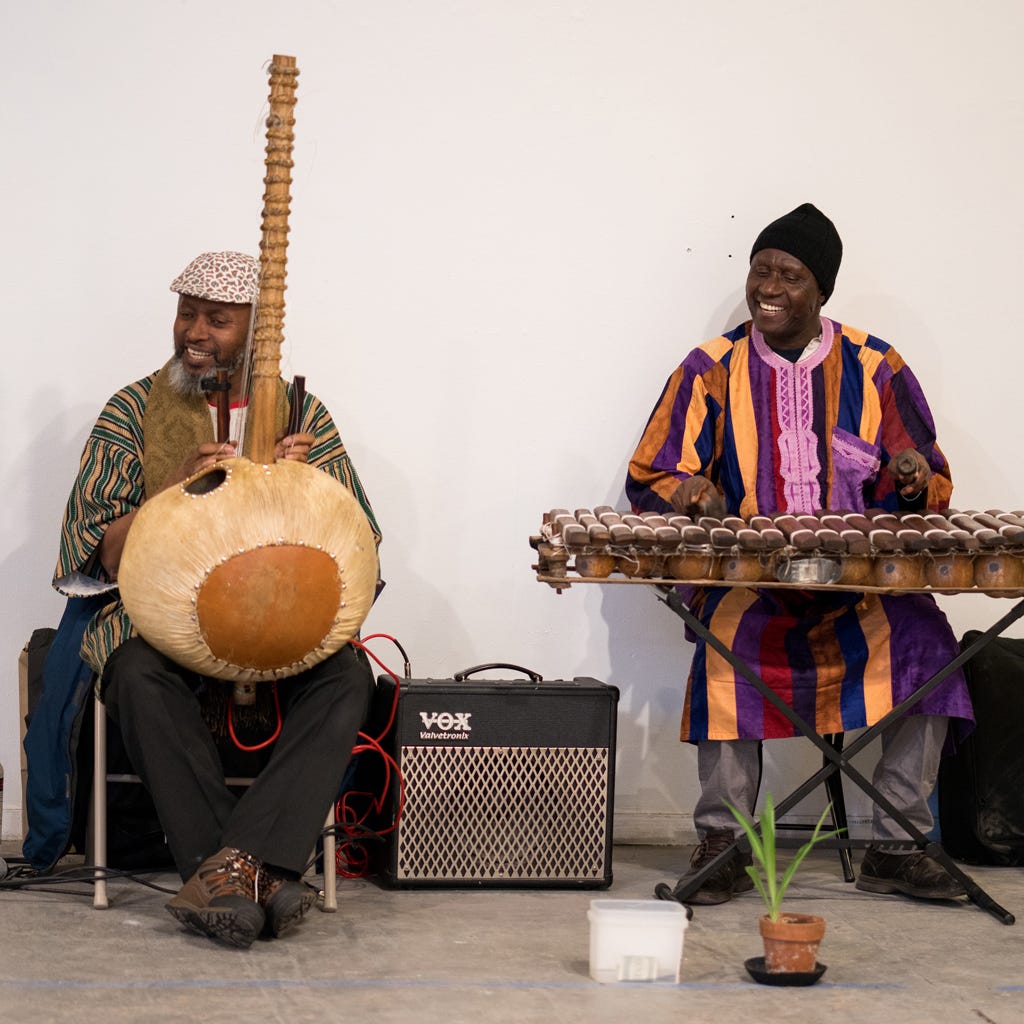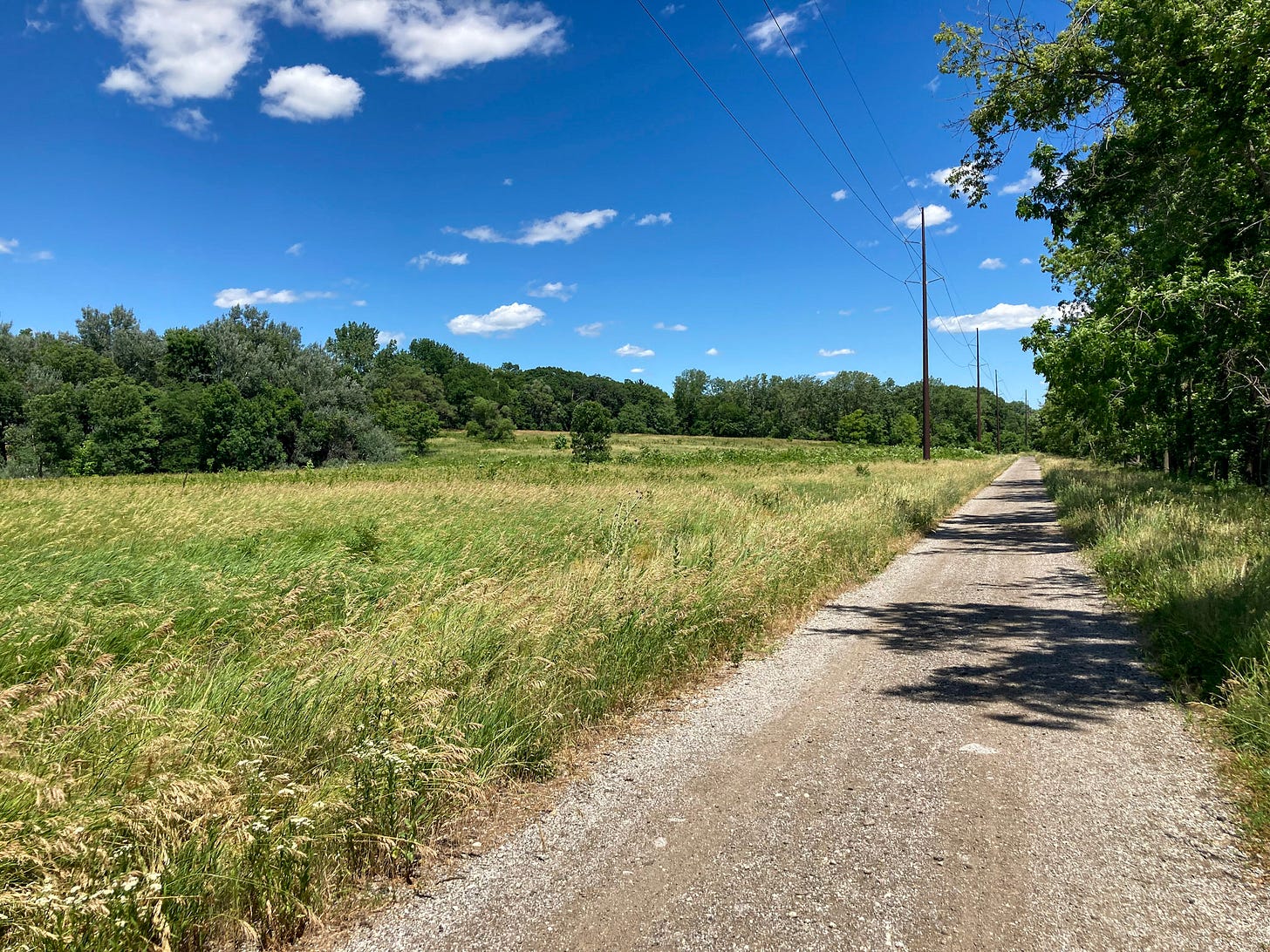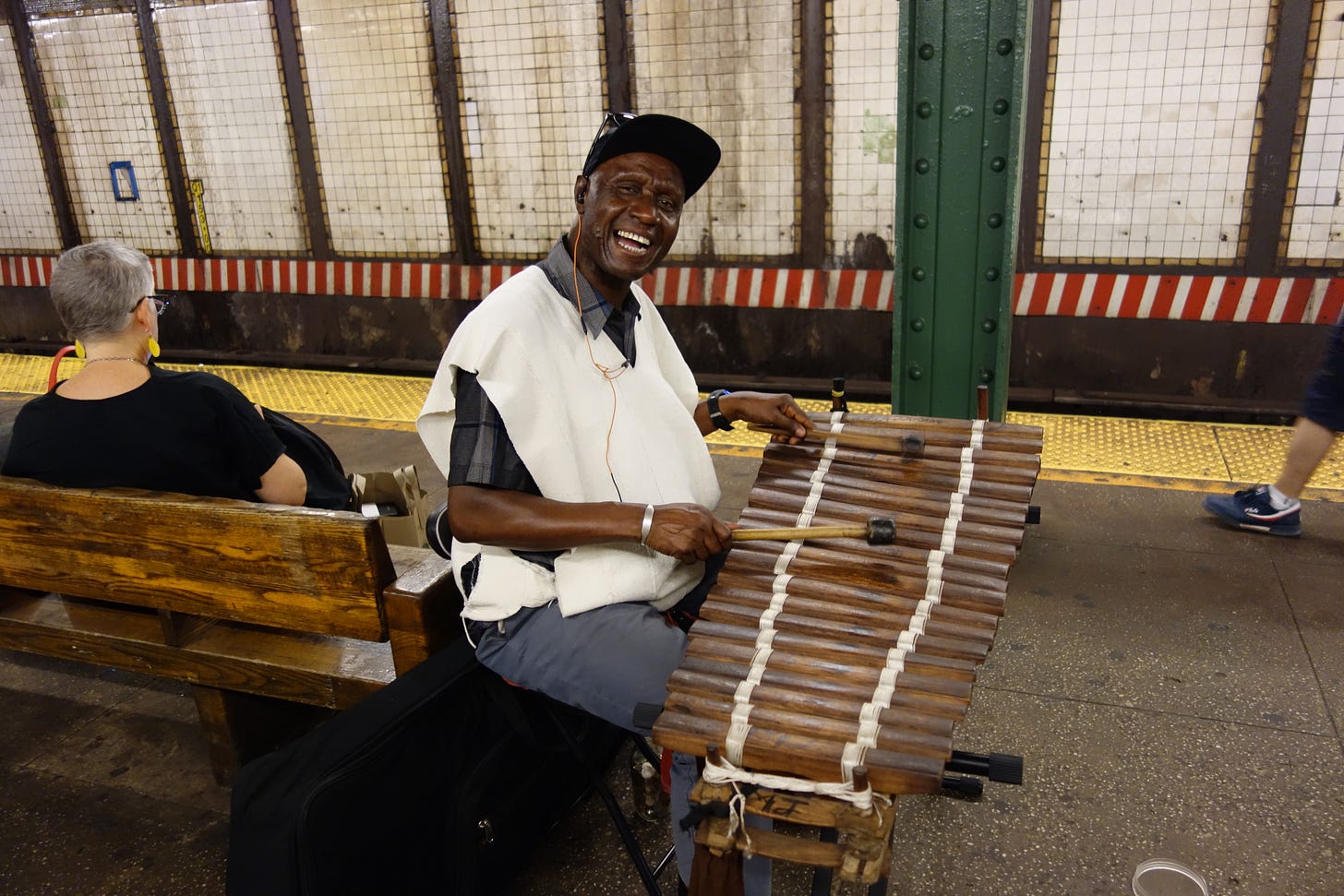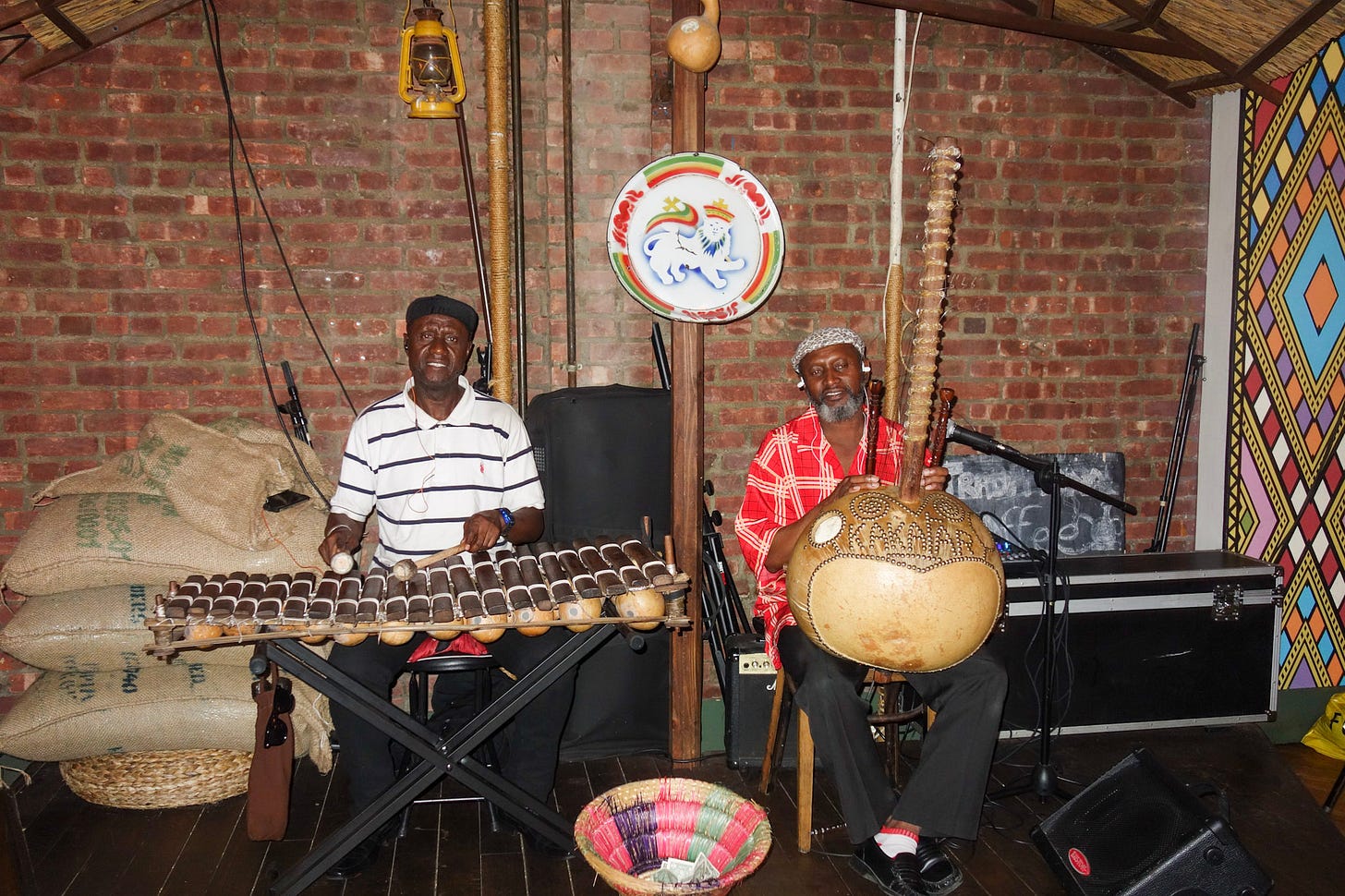Pedestrian: 17 – An Interview With Ebrima Jassey and Salieu Suso
Suso and Jassey on playing the subway, moving to America, and making new friends.
Greetings from Brooklyn!
After three wonderful months of walking around Des Moines, Iowa, I’m officially back in the Big Apple. While I’ll always have mixed feelings about returning to the city after an extended stay elsewhere (especially after three months…dang it’s so easy to relax…), I’m happy walking these busy streets once again.
Coincidentally, my first full day back in Brooklyn was the three year anniversary of the release of Pedestrian Magazine 02, which features an interview with Ebrima Jassey and Salieu Suso, two very talented musicians from The Gambia in West Africa. Our friendship started after I met Ebrima at the Union Station L stop where he frequently performs. He soon introduced me to his brother, Salieu. Today I would like to share that interview with you.
Back in July 2018, on a blazing hot summer day, I took an hour-long train ride from my apartment in Brooklyn, to meet Ebrima and Salieu for lunch at their favorite restaurant in The Bronx where this conversation took place. Below is the original interview as it appears in Pedestrian Magazine Issue 02. Enjoy!
Just a friendly reminder. All issues of Pedestrian Magazine are available digitally to members of the Pedestrian patreon. Thanks to all who have signed up to support this project!
From The Gambia to The Bronx:
An Interview With Salieu Suso and Ebrima Jassey

Suso and Jassey are Gambian musicians and composers born into a family of Jali’s (West African storytellers, historians, and musicians) extending back nearly 1000 years. Playing the kora and balafon respectively, both have played extensively in Africa and Europe before settling in New York City where they are keeping the Jali tradition alive and well. [This interview was originally released in issue 02 of Pedestrian Magazine, August 2018.]
Alex Wolfe: How did you learn to play your instruments?
Salieu Suso: I learned it from my father. My father learned from his father and he learned it from his father. I come from generations upon generations of kora players. It's a tradition that is passed down. I’ve played the kora since I was 8 years old.
Ebrima Jassey: I’ve been playing the balafon since I was young. I watched people and listened to the radio. Nobody taught me [smiles].
SS: No, his father taught him! He learned from his father. We are both Griots which means we have a traditional role in the family as a musician or storyteller. Griot is like a loose interpretation, but we consider ourselves Jali’s [another name for Griot].
It doesn’t matter where you live. We are all connected when you are a Jali or Griot because we have an indirect marriage. It doesn’t matter if you live in Mali, Guinea, Gambia, if your last name is in the category of Griot, you are considered family.
AW: What kind of songs do you play?
SS: We play traditional songs. We play some contemporary [music], but basically we stick with the traditionals. A lot of the time the traditional songs are dedicated to the important people. People like the kings and queens or the public advocates. I usually say that in my performances. It’s not only just playing music – every song has a story. And if you want to deal with that story for that particular performance then that’s the only song we are gonna do. We don’t even have time [to play the whole song] because most performance times are 30 or 45 minutes. These stories are like two, three hours long. [Ebrima laughs]. We just have to cut them down.
AW: What was it like growing up in The Gambia?
SS: It was beautiful. [There were] no restrictions on the beaches, no restrictions in the forests. You could play wherever you wanted. The only problem was in the river. In some rivers there are very crazy crocodiles and hippos. So your parents wouldn’t let you mess with those rivers. Other than that you kept busy going to school, learning music, learning the Quran. They kept you very busy. Farming is also a big time activity. You go out and get some rest and learn some of the traditional things. Or in the morning you get up and do your lessons, then go to the farm. Sometimes you’ll take care of the cattle, goats, sheeps and take them to the bush to get the food. It’s a busy life.
AW: You guys traveled around playing music before you came to the States?
SS: Yes, we traveled to many different areas: Gambia, Senegal, Mali, Nigeria. All of Africa and Europe.
AW: When was the first time you came to America?
EJ: In 1995 to play balafon with the Jaliba Kuyateh and Kumareh Band. Since 1995 I came and I went, until I moved here 4 years ago.
SS: The first time I came to America was 1989. I was in Europe playing music and made some money. I went back to Gambia and I was trying to think of what to do with my money. So at that time the Nike sneakers were very popular. People come here [to the States] and go sell them in Africa and make a lot of money. It didn’t work out for me.
So I came here to buy the sneakers in ’89 and ended up meeting a guy in a band. He fell in love with me. He already lived here in New York for like 40 years and had a group, Le Ballet African De Papa Ladji Camara. He made me work with them, the musicians, the dancers, and music. I said to them “I gotta go back to Gambia,” but he just kept calling me saying, “Hey we got a gig in Massachusetts and Portland.” He was calling me asking me to come back to America. I finally moved here in 1997, but my first intention was to start a business in 1989.
Upon arrival [in 1989] I was robbed in a taxi at the airport. They took all the money I was going to use to buy sneakers. I was lucky I had some money in my pocket, but he took all the money in my wallet. I took out my wallet to pay the taxi driver and he robbed me.
I went to the Kenmore Hotel on 23rd Street, spent the night, and then made a call to Gambia. I was given one of my relatives' phone numbers who lived here in The Bronx. I called that guy and I told him my situation. He said, “Don’t worry I’ll come pick you up tomorrow.” I was lucky, he was a taxi driver. He picked me up and I told him, “All my money’s gone. I have no money.” So I was lucky he picked me up. I had a few dollars to eat, but he took me home to friends. So I was very welcome there and very respected by the younger guys I was living with in the apartment. I was older than them, so they were kinda like “big brother, big brother.” That was good.
Since I became connected with the music thing I didn’t worry about the sneakers anymore. Things happen for a reason. I was thinking that even if I went and got those sneakers and went back [to The Gambia,] I was probably going to make profit, but all my profit would go back to my relatives. My brothers and cousins were going to take the sneakers. Some of them would pay and some of them weren’t going to pay. So I was thinking about all that. The people that make money out of it don’t care about family or relatives. They just want the money, but for me, I have too much of a heart.
AW: What was it like immigrating to America?
SS: I was already here when [Ebrima] came here, so I could help him out. For us there’s not a lot of relatives here. We had to struggle. It was pretty hard. It was hard to find a place to live. You have to be a very patient person. Sometimes you live with people and they make a lot of noise. They don’t care about whether you are sleeping or not, or if you have to go to work in the morning. I was living in a two bedroom apartment sharing my bedroom with two people. I was lucky though, because those guys were already working, and they let me stay for a while before I started making my own money.
AW: Have you always played music to make a living or did you ever have to work odd jobs?
SS: Oh yeah, I had to do odd jobs because music isn’t always consistent. I used to work at Dunkin Donuts, McDonalds, and I did security. I was lucky because whenever music was slow I could go and get some of those kinds of jobs, but music always pulled me out. That’s why I stuck with it. I used to work with this lady at City College who did a lot of the programming. She liked to work with me and did presentations in the classrooms at elementary schools. One time she called me for a gig, told me the date and I said, “Oh my, I can’t make it.” She said, “Why can’t you do it, what kind of job?” I said, “McDonalds.”
“Oh my god, oh my god! You leave this valuable tradition and go work at McDonalds. Are you crazy?” I said, “No I’m not crazy, but I need to pay my bills!”
“You can pay your bills on this job you are doing, don’t you know that?’” I didn’t know ‘cause I wasn’t making any money. You have to know what to do with [the music.] She said, “Don’t do it. They’re not going to let you play music anymore if you go take those jobs.” After she gave me that advice, I was like, “Whatever she’s talking nonsense. I have to pay my bills. I’m going to wait here for someone to pay me to play the kora?” Afterwards I realized what she said is true. I worked at that place and people started calling me, “Kora player, kora player, kora player,” and I told my boss. My boss liked me and trusted me. He gave me the key to the McDonalds even. He said, “I trust you and I know you are a good person, so I’m giving you the key.” I told him, “Well you know I’m an artist.” He said, “Don’t worry, just let me know in advance so I can get someone to cover your shift.” Then it started happening two, three times a week. and he realized that it wasn’t going to work.
You know the money I get from the music is much better, so one day I sat down with him and he asked, “Are you really making money with your music? How much do you make at these concerts?” I took out one of my pay slips for one 30 minute program at the school. He looked at that in disbelief. He goes, “Are you doing this job [at McDonalds] because you love it?” I said, “No this doesn’t come up all the time.” And after that he didn’t bother me anymore.
AW: Ebrima did you just always just play music or did you do odd jobs?
EJ: I prefer music but I had one odd job. I had a job doing store work at a jewelry store.
AW: You sold jewelry?
EJ: No, I was just the security guard and sometimes I cleaned the floor, but for 6 months only and then I would go back to Gambia. When I came back again I found another store and I was there for 6 months and then I would go back to Gambia again and I come back to the States. When I came back in 2016 I only did music. I was just a security guard before that.
AW: You must have been one friendly security guard?
EJ: [laughs] Yes.
AW: Is there a large Gambian community in The Bronx?
SS: We have cousins and friends. So, yeah we have a big community here. Not too long ago, we had a young lady from Gambia pass away. She fell on the subway tracks. There’s still an investigation going on. People don’t know how she fell on the track, so the police said she was drunk. But she didn’t drink. The question was how did she get there? It was possible somebody pushed her, but nobody saw who did it. So the police said they had to do an investigation to find out what happened. Then wooow! A LOT of the Gambian community come together.
So they had to take an autopsy to check and decided they would have to do more investigating. So that’s the day I knew there were a lot of Gambians in The Bronx. They showed up to show solidarity. Most of the Gambians are Muslims and they believe that God is there to protect, but whenever someone is to go, there is a reason for that to happen. Some of the people wanted to protest, but the family said “No, no, no…no protests. This is an act of god. So let's pray for her and let's pray that what happened was in the hands of god. Maybe our prayers can tell us what happened.”
So that’s the day I knew there were a lot of Gambians here in The Bronx. When I first came out here there were very few Africans up here. At that time from 1997 - 2007 we all knew each other. We all came from the same place. So at Christmas we would have a “Christmas Party” even though we are not Christians and everyone would come out to the party. Sometimes we have a Ramadan ending party. This year we didn’t have it, but usually we have it.
AW: How does playing music in New York City compare to playing in The Gambia?
SS: It is very different. In Gambia there are hundreds of kora players. In the states there are very few Kora players. There are more opportunities here, more work, more connections. Because of connections here, I'll go to South America to perform sometimes. Bogota, Santo Domingo, Mexico. Sometimes I’ll even go to Barbados in the Caribbean.
EJ: I used to play concerts with the Kumareh Band – big concerts! [We traveled to] Senegal, Nigeria, Europe… I went to Sweden, Norway, Switzerland and Italy all since 1988. The band was established in 1975, but in 2014, I left the band to come to America. We maybe only had to play one to two times a week in Gambia, but In New York City we are always working, [playing]. I’ve had two balafons. since I moved here. When I went back to Gambia I got another one. If you want a good one you go to Gambia or Mali or Guinea or Senegal. The ones for tourists won’t work long, maybe one or two years and then it will break. I’ve had my newest balafon, Mama Jabang, for almost two years now. I named it after a woman I met through my friend’s wife’s younger sister, and she’s from The Gambia. I never knew her in The Gambia, but we met here. She is very friendly to people so I decided to name my balafon after her.
AW: Do you have any stories from playing performances?
SS: Oh yeah, some days you get funny stories. Sometimes you get positive stories. One day I was playing on the subway and a guy goes, “Shut the fuck up with that shit!”
AW: You were there for that Ebrima?
EJ: Yes, Yes, I was there [nods in agreement].
SS: “Shut the fuck up with that Shit! Nobody want to hear that!” I just stopped. I was going to reply to his nasty comment, but then one other guy came right up [to me] and said, “don’t listen to this stupid guy. He doesn’t know what he’s talking about. What he said isn’t true. Everybody love your music. When people pass you they make a lot of good comments about you. So don’t listen to him”
One day I was playing at Times Square and I noticed a very big, tall Spanish guy. He was sick, a very sick person, mentally ill. He was walking fast and sweating! And he when he heard the kora he stopped completely and started getting close, looked at me and was still sweating. The look on his face made me think, “This guy…he doesn’t look healthy.” I was a little worried about what he was going to do next. Something told me to stop playing and listen to what this guy was going to say. So I stopped and he came closer to me and says “you don’t know how much I appreciate your music”. I said, “What?” He said, “you heal me.”
“You heal me?”
“Yes, cant you see I am sick? I had a very disturbing feeling, but when I heard you, I stopped. I feel better, I feel better, I feel like I could stay up forever.” I said, “Wow, you made my day.” I get that comment a lot of the time. I think on that day I put it on my facebook or email. I sent it to some people. One of my friends was like, “Yeah man I know you heal people! We don’t need a gym when you play. We can just exercise to your music.” Sometimes you know you get good comments. Sometimes you get bad comments. Some people get jealous.
AW: Jealous?
SS: Because they don’t know what you do. They don’t know how to do it. They see people giving you money and think I shouldn’t stay here because I’m going to make some money. One time I was at the 34th Street and 7th Avenue McDonalds with a sign from the MTA. I was sitting there and playing, people were giving me money, and this woman comes from nowhere and says, “stop, stop this!”
“Are you okay?”
“Yeah, I’m okay. You’re not allowed to do this here. Stop this!”
And She’s looking at my money. It looked like she was counting how much was in the jar. I said, “Look, you don’t know what you’re talking about. Can’t you see my sign? Can’t you read that? The sign, it comes from the MTA. And you’re telling me I’m not allowed? I’m not allowed to be here? Look at that sign!” And she walked away. So sometimes you know, I feel like some people don’t want me to have that little box where people are dropping the buck inside of the bag. She’s jealous. Sometimes that happens.
Sometimes even in a rare performance you get into that situation. Ten years ago I was playing in a festival in Atlanta at the Emory University Library. They had a festival called Passport where they have immigrants and citizens play. I was the only kora player there so everybody was looking at the instrument. I met some people and they were making nice comments.
You know everybody thinks all Africans play the drum, but I play a stringed instrument. People don’t know that its very common in Africa. The manager who brought me here said he would introduce me to the other fellow musicians. When we got to them it looked like nobody even cared. I think the other musicians were jealous. He told me not to worry, just to be careful. He brought me here and knew that I was valid. So from then on I realized that sometimes you go to some places and people like you and in other places nobody likes you. Some people even make comments like, “Oh I know another guy who play this instrument much better.”
AW: How do you like playing on the Subway?
SS: I like playing on the subway. It gives you more opportunities to connect with the world. Sometimes I meet people from different countries. Sometimes I meet people from New York. They say “Oh, I’ve been looking for African music. Can you play for my wedding?” I get so many of those kind of gigs. I played for a guy from London whose wife was from Nigeria. We met on the subway.
Another girl from Sierra Leon and an African-American guy, who actually met each other on the train, wanted me to play their wedding at the Brooklyn Botanical Garden. So playing on the subway is not only to get tips, but to get connections.
AW: How do you like playing on the subway Ebrima?
EJ: [laughs] How do you know me?
AW: We met on the subway.
EJ: [laughs] That's it! We get more opportunities out there. We make more friends.
Thanks for reading. See you next time. – Alex
P.s. here’s a beautiful song from Salieu’s album, Griot.
SUPPORT THIS NEWSLETTER
You can support Pedestrian by signing up for the patreon. For $5/month you’ll get access to the entire Philly walk newsletter archive, digital copies of Pedestrian Magazine 1–5, and monthly members only updates.
If recurring subscriptions aren’t your thing, you can still send a few bucks to my Venmo (@wolfealexandert).
Don't have the funds, but still want to support? Why not share this sign up link with all your friends?
Thanks :) Your support means the world.




